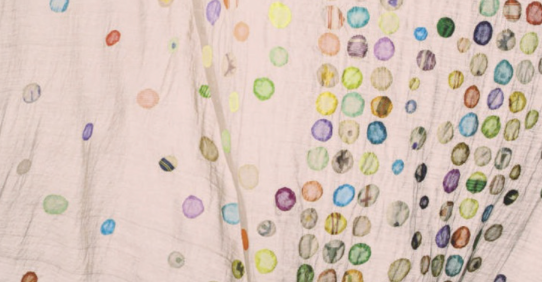
SCRAPS No Waste Production
Growing up in postwar South Korea, Christina Kim showed an early interest in what might now be referred to as repurposing; finding new uses for hand-me-down clothes, long before it was fashionable. Just fifteen years after she moved to the US in 1971, Kim founded her now international brand, dosa. Celebrated for it’s ethically produced, handcrafted clothes, accessories and homewares, the LA based fashion house produces just one collection a year. In the early years of dosa much of Kim’s time was taken up with day-to-day operations, ‘As an owner of a small design company, you end up taking the trash out at the end of the day’. However, by 1996 she was more heavily involved in the production of her brand and began wondering about the environmental significance of what she threw out at the end of each day. It was at this time, decades ahead of many fashion houses, that Kim began to consider what it meant to be a conscientious designer. In response, over 12,400 kilograms of polar fleece, previously consigned to the trash, were used to stuff over 1,400 leather poufs. This comparatively simple step saw 100% of the scraps reused, a process that would go on to inform much of dosa’s design ethos.


In 2008 Kim once again renewed her own commitment to ethical and renewable production, asking herself ‘Is it organic? Is it recycled? Is it off the grid?’. Dosa defines off the grid as being handmade or handworked using human energy rather than by machine. Handworked means that 20-30% of the garment has been transformed by an artisan’s hand G
Design via hand-stitching, woodblock printing, handpainting, or embroidery. This commitment to traditional processes meant that as of 2015, over 75% of dosa’s products were handmade or handworked. In more recent times, alongside yearly new designs, dosa has been producing ‘standard issue’, a core collection that takes inspiration and utilises techniques from around the world. This collection, as with many of Kim’s designs, is created with functionality in mind. Indian inspired shapes, in shades of white reminiscent of Korean porcelain, pay homage to ‘uniforms from the world’s fields and roads’. Many pieces are organic, natural dyed and hand loomed. However, dosa’s commitment to sustainability extends beyond its sourcing and its makers. Starting in 2008, Kim’s brand began to produce re
engineered textiles. Using scraps from the previous six years’ collections, over 600 new garments and 2000 accessories were created in a variety of styles. Now with a tried and tested process for collecting, organising and re-using scraps, Kim sees the beauty in the colour combinations of the otherwise discarded materials, utilising even the tiniest of off cuts. Kim herself acknowledges that ‘the process of recycling, sorting, documenting, cutting, patching and sewing all require time’. However, she is confident that the investment makes environmental and financial sense. With 50% of the cost of a nonrecycled production attributed to fabrics, but 90% of the costs of a recycled production attributed to labour, her argument for this fairer means of production is hard to fault.

Kim’s commitment to the preservation of traditional skills, her passion for creating work for artisans around the world and her undeniable talent for combining style, functionality and sustainability has earned her a wide ranging following. With a flagship store in LA, her brand available in stores across the US, Europe and Asia and Jennifer Aniston, Julia Roberts and Nicole Kidman among her high-profile fans, she has carved a niche for herself in the fastmoving world of fashion. In a time when brands increasingly rush, often unconvincingly, to assert the ethics of their production lines, it’s refreshing to see a company with nothing to hide. Rather than a somewhat vague ‘ethical production statement’ - a document that is of great importance when properly utilised - dosa’s website features a ‘glossary’. Described as ‘a collection of techniques, textiles, people, and organisations involved with dosa, past and present’ the extensive archive explores the artisanal techniques dosa employs and their history in fascinating detail. Similar to concerns about food chains, Kim believes that people need to know where goods come from and how they are made. In a time of great change for fashion, but when throw away purchases remain by far the cheapest and most convenient option, Kim’s insight can leave us with little doubt as to the importance of ethical production, in order to continue to create a fairer and more sustainable future for the industry.
This article was previously published on issue 93 Rethink, available for purchase on our website. Text by Philippa Kelly.

2 comments
I just love this! Repurposed with incredible beauty!
I’m lucky enough to have that beautiful fabric shown in the first picture. I use it as a curtain and occasionally as a Shawl. Christina Kim is a force of nature, a lovely generous person and her use of ‘Scraps’ a work of genius.